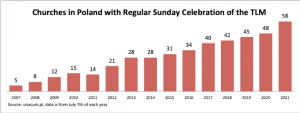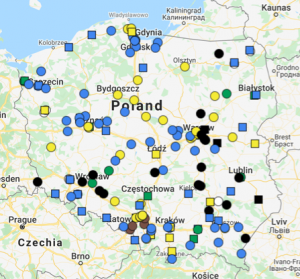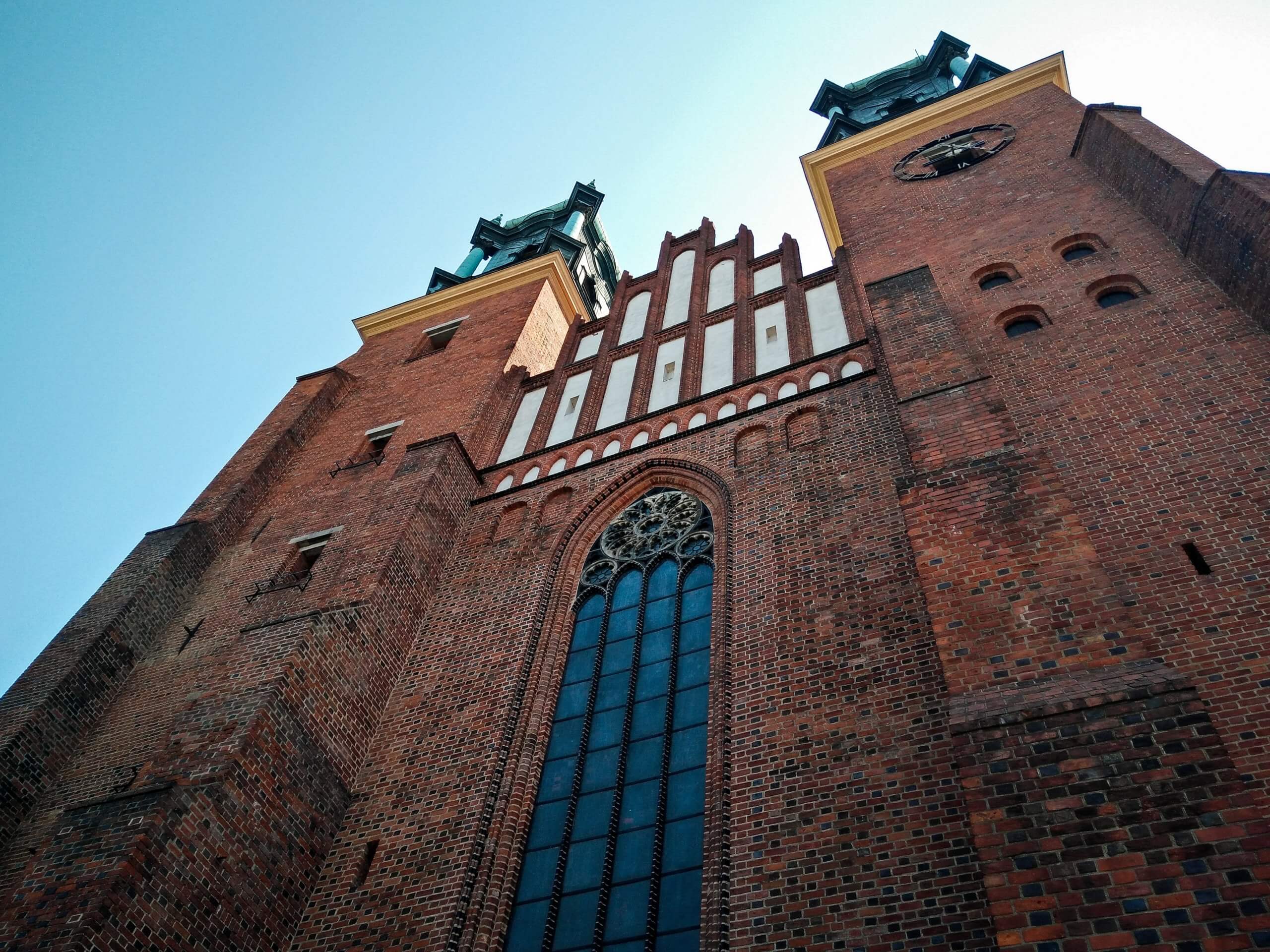Despite the decline of the Catholic Church in almost every metric since the Second Vatican council, Poland remains a strongly Catholic country, at least in relative terms. Poland was behind the iron curtain when the reforms of Vatican II were implemented, and the Catholic Church provided an oasis of hope to the people against the Marxists. This hope was further strengthened when one of their own, Cardinal Karol Wojtyła, the archbishop of Krakow, was chosen as the successor to St. Peter. It was this combination of circumstances that helped Poland remain strongly Catholic and pious despite the shortcomings of Vatican II.
The Traditional Roman Rite in Poland
Before we discuss the Polish reaction to the Motu Proprio, lets briefly look at the status of the Traditional Latin Mass (TLM) in Poland since Summorum Pontificum. According to Unacum.pl, almost a week before Traditionis Custodes there were 155 officially known churches that celebrated the TLM, of which 58 offered a regularly scheduled weekly Sunday mass. Jarosław Syrkiewicz from the association Una Voce Polonia estimates that there are about 40 additional places where the TLM is celebrated unofficially. Based on his estimates, there are about ten thousand regular attendees to the TLM every Sunday with about 50 to 80 thousand coming to a regularly scheduled non-weekly Sunday Traditional Latin Mass in the country.

The rise of the TLM in Poland since Summorum Pontificum in 2007 is summarized in the above graph. These numbers exclude the many more churches that offer the mass less frequently then weekly on Sunday. This trend is similar to what many other countries have experienced since 2007. Poland is also host of the world’s largest workshop on the traditional Roman Rite. This is “Ars Celebrandi” in Lichen where priests and altar servers learn to celebrate and choirs learn Gregorian chant. This year was the 8th annual workshop which hosted 234 participants including 60 priests from not only Poland but also France, Germany, Belgium. In Poland, two congregations that specialize exclusively in the traditional rite are active in Poland: The Fraternity of St. Peter (based in Krakow) and the Institute of the Good Shepherd (operating in Warsaw, Brwinów, Białystok and Częstochowa). However, in most places the TLM is celebrated by diocesan priests. And of course, there is also the Society of Saint Pius X.
The Motu Proprio
After the publication of Traditionis Custodes, reaction of the Polish Church has been varied. This is seen even in the capital, Warsaw. There are two main dioceses in Warsaw: the Archdiocese of Warsaw on the west side of the Vistula river and the Diocese of Warsaw-Praga on the east side of the Vistula River. Within 24 hours of the motu proprio, the TLM on Karolkowa Street in the Archdiocese of Warsaw (one of the most popularly visited churches) posted on their website that there will be Sunday Mass like normal. In fact, all the churches within the Archdiocese of Warsaw continued their TLM celebrations as if Traditionis Custodes never happened. The diocese currently has ten parishes offering the TLM.
The same cannot be said for the Diocese of Warsaw-Praga on the other side of the Vistula river. On the Sunday after the motu proprio, the diocese officially communicated: “Until the place is designated where the Eucharist will be celebrated according to the Roman Missal of 1962 and the presbyter is appointed to take care of this group, all liturgies according to the extraordinary form of the Roman Rite are suspended in the Warsaw-Prague diocese.” This decision effectively cancelled all masses in the diocese celebrated in the old rite at least until further notice. Seven parishes were affected. The only place where the TLM is offered within the east side of the Vistula is the humble yet packed chapel of the Society of Saint Pius X which also runs a private traditional Catholic school and boy scouts. The different approaches of the dioceses of east and west Warsaw were striking.
The reactions of different dioceses within Poland was also diverse but most were favorable towards the vibrant and faithful TLM communities and allowed a continuation of the status quo. The primate of Poland and Archbishop of Gniezdo, Wojciech Polak, decided that in the Archdiocese of Gniezno, the traditional Roman Rite may be celebrated “in places and times where they have been celebrated thus far.”
The Archdiocese of Wrocław has delegated the exclusive right to celebrate the TLM to a single clergyman which effectively cancelled the TLM in four parishes leaving only one where it is available. Meanwhile, the Diocese of Sandomierz had three parishes which offered the TLM including in the beautiful Cathedral Basilica. After the motu propio the diocese decided to close all existing TLM masses and relocate them to the Dominican Monastery in the village of Klimontow as a temporary measure until a more permanent solution can be arranged.

According to the map from Unacum.pl shown above, out of the 155 known parishes in Poland that had officially-scheduled Latin Masses, there are 27 parishes that have had the TLM cancelled due to the motu propio (about 17% of the total) and 7 that have been relocated to a new location. However, there are still parishes that are awaiting a reply from their bishop and some diocese which have closed parishes and are in the process of designating priests and permitting the TLM in select parishes. With several bishops still waiting to make decisions on the availability of the Traditional Latin Mass within their diocese, the dust hasn’t yet settled in Poland following the surprise shock of Traditionis Custodes.
The homily of Fr. Konstantyn Najmowicz from the SSPX chapel in Warsaw on the second Sunday following the motu propio is very revealing and gives insight from those that are on the frontlines of tradition. As Mr. DiPippo also observed recently at New Liturgical Movement, Fr. Najmowicz lamented the decision to delete the former praise of the traditional rite:
It is amazing that even the Polish bishops on [Holy] Thursday wrote to the priests praising this mass, mentioning the good influence this mass has on spiritual and moral revival, especially in the young generation. And it is amazing that they deleted this fragment from their letter and on the website of the episcopate you won’t find it anymore.
In conclusion, he encouraged the faithful:
But in all this we must remember that we must not be swayed in faith, we must not deny the faith. Even Pope Benedict, while freeing the mass, explained to the bishops that what was holy in the past cannot be forbidden, so even if we encounter restrictions, penalties, excommunications, let us remember that, if we simply hold onto the faith, we do not commit a crime and any punishment is not valid. These excommunications would only turn against those who throw thunder on the tradition, at the mass, against the Catholic Church, Amen.
Photo credit: The Archcathedral Basilica of Sts. Peter & Paul, Poznań, Poland by Twixes via unsplash.com


